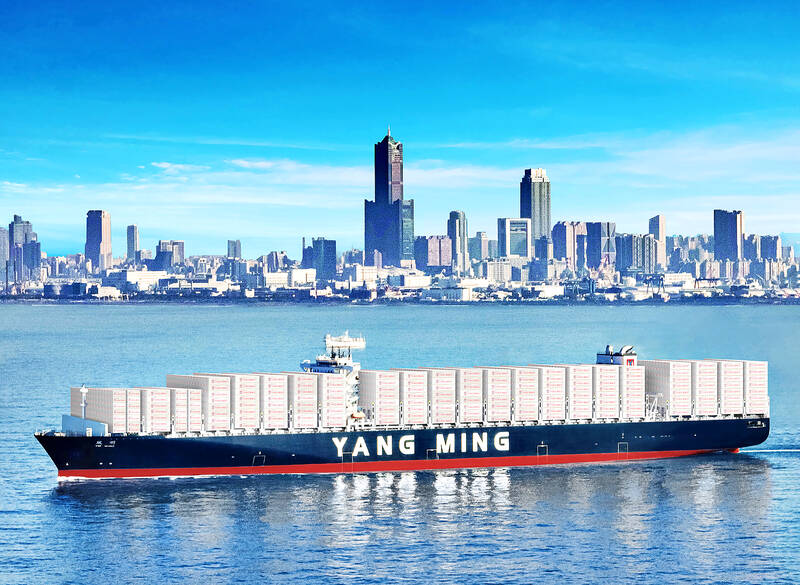Yang Ming Marine Transport Corp (陽明海運) has turned conservative about the market’s outlook as it faces pressure from clients to renegotiate freight rates.
The world’s ninth-largest cargo shipper in terms of shipping capacity was in March upbeat about freight rates, but yesterday told investors that soaring inflation worldwide and the ongoing Russia-Ukraine war pose strong headwinds ahead.
“Forecasting how rates would change is difficult given the uncertainty in global business outlook,” Yang Ming chief operating officer Chang Chao-feng (張紹豐) said. “Because spot rates have plunged, we do face pressure from some clients demanding rate adjustments for long-term contracts.”

Photo courtesy of Yang Ming Marine Transport Corp
In principle, Yang Ming offers short-term discounts in response to such requests, Chang said.
Even though the contract terms do not allow price revisions, the shipper could be flexible to maintain long-term relations with clients, he said.
Average shipping rates slid to US$2,854 per twenty-foot equivalent unit in June, falling for the fourth straight month from US$3,417 in February, company data showed.
Falling rates caused Yang Ming’s gross margin to drop from 70.58 percent in the first quarter to 66.2 percent in the second quarter, although it was still higher than 60.17 percent a year earlier, it said.
The shipper expects December to be a peak month as the Lunar New Year holiday would fall in January next year, so most clients would want to ship their goods at least a month earlier, it said.
However, the outlook for freight rates in the first half of next year remains clouded, Yang Ming said, citing factors such as consumption strength, inflationary pressure, shipping demand, new vessels and seaport congestion.

Micron Memory Taiwan Co (台灣美光), a subsidiary of US memorychip maker Micron Technology Inc, has been granted a NT$4.7 billion (US$149.5 million) subsidy under the Ministry of Economic Affairs A+ Corporate Innovation and R&D Enhancement program, the ministry said yesterday. The US memorychip maker’s program aims to back the development of high-performance and high-bandwidth memory chips with a total budget of NT$11.75 billion, the ministry said. Aside from the government funding, Micron is to inject the remaining investment of NT$7.06 billion as the company applied to participate the government’s Global Innovation Partnership Program to deepen technology cooperation, a ministry official told the

Taiwan Semiconductor Manufacturing Co (TSMC, 台積電), the world’s leading advanced chipmaker, officially began volume production of its 2-nanometer chips in the fourth quarter of this year, according to a recent update on the company’s Web site. The low-key announcement confirms that TSMC, the go-to chipmaker for artificial intelligence (AI) hardware providers Nvidia Corp and iPhone maker Apple Inc, met its original roadmap for the next-generation technology. Production is currently centered at Fab 22 in Kaohsiung, utilizing the company’s first-generation nanosheet transistor technology. The new architecture achieves “full-node strides in performance and power consumption,” TSMC said. The company described the 2nm process as

POTENTIAL demand: Tesla’s chance of reclaiming its leadership in EVs seems uncertain, but breakthrough in full self-driving could help boost sales, an analyst said Chinese auto giant BYD Co (比亞迪) is poised to surpass Tesla Inc as the world’s biggest electric vehicle (EV) company in annual sales. The two groups are expected to soon publish their final figures for this year, and based on sales data so far this year, there is almost no chance the US company led by CEO Elon Musk would retain its leadership position. As of the end of last month, BYD, which also produces hybrid vehicles, had sold 2.07 million EVs. Tesla, for its part, had sold 1.22 million by the end of September. Tesla’s September figures included a one-time boost in

Shares in Taiwan closed at a new high yesterday, the first trading day of the new year, as contract chipmaker Taiwan Semiconductor Manufacturing Co (TSMC, 台積電) continued to break records amid an artificial intelligence (AI) boom, dealers said. The TAIEX closed up 386.21 points, or 1.33 percent, at 29,349.81, with turnover totaling NT$648.844 billion (US$20.65 billion). “Judging from a stronger Taiwan dollar against the US dollar, I think foreign institutional investors returned from the holidays and brought funds into the local market,” Concord Securities Co (康和證券) analyst Kerry Huang (黃志祺) said. “Foreign investors just rebuilt their positions with TSMC as their top target,